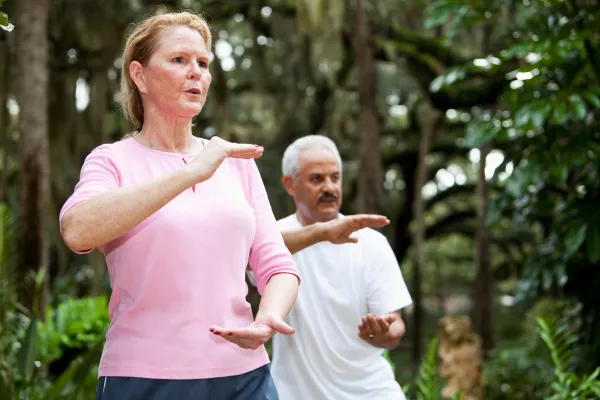
Read Our Blogs

The Benefits of Tai Chi for Seniors: Improving Balance, Coordination, and Well-being
Tai chi, an ancient Chinese practice often described as "meditation in motion," offers a unique blend of physical exercise, mindfulness, and stress reduction. With its slow, graceful movements, deep breathing, and meditative focus, tai chi provides a holistic approach to well-being that is particularly beneficial for seniors. As we age, maintaining balance, flexibility, and mental clarity becomes increasingly important, and tai chi offers a gentle yet powerful path to achieving these goals.
The Bountiful Benefits of Tai Chi for Seniors: A Holistic Approach to Well-being
Tai chi's gentle embrace extends far beyond the physical realm, encompassing mental, emotional, and even spiritual dimensions of well-being.
Physical Benefits: Cultivating Strength, Flexibility, and Balance in Motion
Tai chi's slow, deliberate movements, coordinated with deep breathing, offer a unique form of exercise that enhances physical function and promotes overall well-being.
Improved Balance: Tai chi's emphasis on shifting weight and coordinating movement challenges balance and coordination, helping to reduce the risk of falls. This is particularly crucial for seniors, as falls can lead to serious injuries and a decline in independence.
Increased Flexibility: The gentle stretches and flowing movements of tai chi improve flexibility and range of motion, making it easier to perform everyday activities and maintain mobility. This can help reduce stiffness, improve posture, and enhance overall physical comfort.
Enhanced Strength: While tai chi is a low-impact exercise, it can help improve muscle strength, particularly in the legs and core. These muscle groups are essential for maintaining balance, stability, and functional independence.
Improved Cardiovascular Health: Tai chi can benefit cardiovascular health by increasing blood flow and lowering blood pressure. The gentle movements and deep breathing promote circulation and can help reduce the risk of heart disease and stroke.
Reduced Pain: Tai chi has been shown to be effective in reducing pain associated with various conditions, such as arthritis, back pain, and fibromyalgia. The gentle movements and focus on relaxation can help alleviate pain, improve mobility, and enhance overall quality of life.
Mental and Emotional Benefits: Finding Stillness in Motion
Tai chi's meditative nature extends beyond the physical, promoting mental clarity, emotional balance, and stress reduction.
Stress Reduction: The slow, flowing movements and deep breathing of tai chi induce a state of relaxation, reducing stress and anxiety. The practice encourages a shift from the sympathetic nervous system (fight-or-flight response) to the parasympathetic nervous system (rest-and-digest response), promoting a sense of calm and tranquility.
Improved Mood: Tai chi can boost mood and reduce symptoms of depression. The gentle exercise, combined with mindfulness and deep breathing, can help release endorphins, natural mood elevators that promote feelings of well-being and contentment.
Enhanced Cognitive Function: Studies have shown that tai chi can improve cognitive function, including memory, attention, and executive function. The practice challenges the brain to coordinate movement, focus attention, and engage in mindful awareness, promoting cognitive vitality and mental sharpness.
Increased Self-Awareness: Tai chi cultivates a deeper connection with your body and mind, increasing self-awareness and mindfulness. The practice encourages you to pay attention to your breath, your posture, and your movements, fostering a greater sense of embodiment and presence.
Getting Started with Tai Chi: Embracing the Gentle Path
Embarking on your tai chi journey can be a rewarding experience, offering a path to improved health, well-being, and self-discovery.
Find a Class: Look for tai chi classes specifically designed for seniors. These classes are often tailored to accommodate varying levels of fitness and mobility, providing a safe and supportive environment for learning.
Start Slowly: Begin with a few basic movements and gradually increase the complexity and duration of your practice as you gain confidence and proficiency. Listen to your body and avoid pushing yourself too hard, especially in the beginning.
Practice Regularly: Consistency is key to reaping the benefits of tai chi. Aim to practice regularly, even for a few minutes each day, to develop your skills, improve your balance, and enhance your overall well-being.
Listen to Your Body: Pay attention to your body's signals during your tai chi practice. If you experience any pain or discomfort, stop and rest. Tai chi should be a gentle and enjoyable experience, not a strenuous workout.
The Wellness Wall: An Indirect Ally in Supporting Your Tai Chi Practice
While the Wellness Wall's primary function lies in medication management, it indirectly supports your tai chi practice by simplifying medication routines and reducing stress. This can free up mental space and energy for you to dedicate to your practice.
Minimizing Balance-Affecting Side Effects: Certain medications can cause side effects that affect balance or coordination, potentially hindering your tai chi practice. By ensuring accurate and timely medication intake, the Wellness Wall helps minimize the risk of these side effects, allowing you to fully engage in your practice and maintain your balance.
Reducing Stress, Enhancing Focus: Stress can significantly impact our ability to focus and be present during tai chi practice. By reducing the stress associated with medication management, the Wellness Wall contributes to a more relaxed and focused state of mind, allowing you to fully immerse yourself in the practice and reap its benefits.
Embrace the Flow of Tai Chi: A Path to Balance and Well-being in the Golden Years
Tai chi is a gentle yet powerful practice that offers a multitude of benefits for seniors, encompassing physical health, mental well-being, and emotional balance. By incorporating tai chi into your routine, you can experience improved balance, increased flexibility, reduced stress, and enhanced cognitive function. Embrace the flow of tai chi, and discover a path to greater balance, vitality, and inner peace in your golden years.

Reliable, professional pressure washing services for pristine results.
Copyright Wellness Wall 2025. All rights reserved
